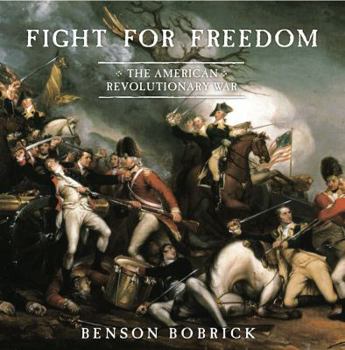Fight for Freedom: The American Revolutionary War
Select Format
Select Condition 
Book Overview
Renowned historian Benson Bobrick has written a moving chronicle of the American Revolution for young readers. From the first stirrings of unrest under British rule at the Boston Tea Party, to the... This description may be from another edition of this product.
Format:Hardcover
Language:English
ISBN:0689864221
ISBN13:9780689864223
Release Date:October 2004
Publisher:Atheneum Books for Young Readers
Length:96 Pages
Weight:1.60 lbs.
Dimensions:0.5" x 10.3" x 10.3"
Age Range:8 to 12 years
Grade Range:Grades 3 to 7
Customer Reviews
2 ratings
BEAUTIFULLY DONE
Published by Thriftbooks.com User , 15 years ago
This book on the American Revolution for youngsters is nowhere surpassed. Bobrick's ANGEL IN THE WHIRLWIND (a book about the Revolution for adults) has become the standard one-volume history of the subject. FIGHT FOR FREEDOM is an excellent companion volume, with many of the same virtues--clarity, intelligence, learning, and nobility of mind--that characterize the earlier work. Bobrick's current book about the Civil War (MASTER OF WAR:THE LIFE OF GENERAL GEORGE H. THOMAS) is yet another gem. (Let's hope he does a companion volume again for youngsters!) In MASTER OF WAR, you can read about a great soldier who (in contrast to Gen. Grant) refused to sacrifice his troops to useless slaughter, won every battle he ever fought, and (unlike Gen. Sherman, for example) insisted on upholding the dignity of black soldiers who enlisted in Union ranks.
Fights for Personal Freedom.
Published by Thriftbooks.com User , 18 years ago
Before the national issue in America in the middle 1800s concerning owning African slaves, a century earlier England had 15,000 of their own slaves from the West Indies. An application to Parliament in 1766 concerning their 'property' or 'commodity' was of great commercial conern to the slave owners who, no doubt, being British called them servants. On June 22, 1772, nearly a century before the slaves were freed in America, a British judge, with a single decision, brought about the conditions that would end slavery in England. His decision would have monumental consequences in the American colonies, leading up to the American Revolution, the Civil War, and beyond. Because of this ruling, history would be forever changed. This book is about that decision and the role of slavery in the founding of the United States. In 1749, a nine-year-old boy growing up in a West African village was kidnapped and transported 'via the infamous Middle Passage' to America where he was bought by Charles Stewart of Norfolk, Virginia. He was a young Scottish-born merchant who was drawn to the tobacco industry and trained him as his own personal servant and business assistant, always at his side as a young man. After twenty years of co-dependence, Charles Stewart sailed to England with Somerset to help raise his sister's children after the death of her husband. The servant had never known such freedom as an adult and insinuated himself into a black community of thousands of former slaves and free persons, mainly from the British West Indian colonies. After two years in London, he left Stewart's home and refused to return. Since leaving his master, he had "insulted his person," caught and set to be deported to Jamaica to be sold as the slave he'd been for 23 years. Some London blacks were free. Some, like Somerset, were slaves to colonials living in London. Some had been freed by their masters. Some worked; some were beggars known as the St. Giles Blackbirds. Some were popular artists and singers. Some were seamen or servants. Some had been runaways whose owners had given up looking for them. Lord Mansfield, the chief justice of the Court of King's Bench, ruled in favor of Somerset who then became a free man. Stewart's lawyer had argued that freeing the fourteen or fifteen thousand slaves in England would produce profound disruption and that the owners would suffer a loss of 700,000 lire or an average of 50 lire per slave. It is documented that Mansfield was biased when he decided that a slave could not be held captive by his master. This, he said, would effectively abolish slavery in England. In the end, James Somerset merged into the black community of London, but his case lived on. Somerset never knew that his private quest for freedom was the spark that helped start the American Revolution and that has haunted the nation down to the present day. Thus, the American Revolution when the southern states joined the northern colonies, to rebel against England's do





